2024
October 28, 2024
Guest Lecture by Dr. Kerstin Leitner, Berlin
Machen Persönlichkeiten oder Institutionen Geschichte? Gibt es Unterschiede zwischen weiblicher und männlicher Führung? Das Beispiel der Vereinten Nationen aus der Sicht einer ehemaligen Mitarbeiterin.
After receiving her Ph.D. in 1975 from the Otto-Suhr-Institute at the Freie Universität Berlin for her research on Kenia’s postcolonial development, Kerstin Leitner started her 30-year career at the United Nations which took her to Africa, China, New York, Geneva, as well as numerous other locations. After returning to Berlin in 2005, she regularly taught classes in international politics, on politics in China, and on the U.N. at both FU Berlin and Universität Potsdam. In her book, Als moderne Nomadin um die Welt / When Only the Sky is the Limit Kerstin Leitner reflects on her work spanning the Cold War, the revolutions of 1989, and the rise of new superpowers. Deeply shaped by experiences during her career she founded the Kerstin Leitner Berlin Fellowships in cooperation with the Ernst-Reuter-Gesellschaft der Freunde, Förderer und Ehemaligen der Freien Universität Berlin e.V.
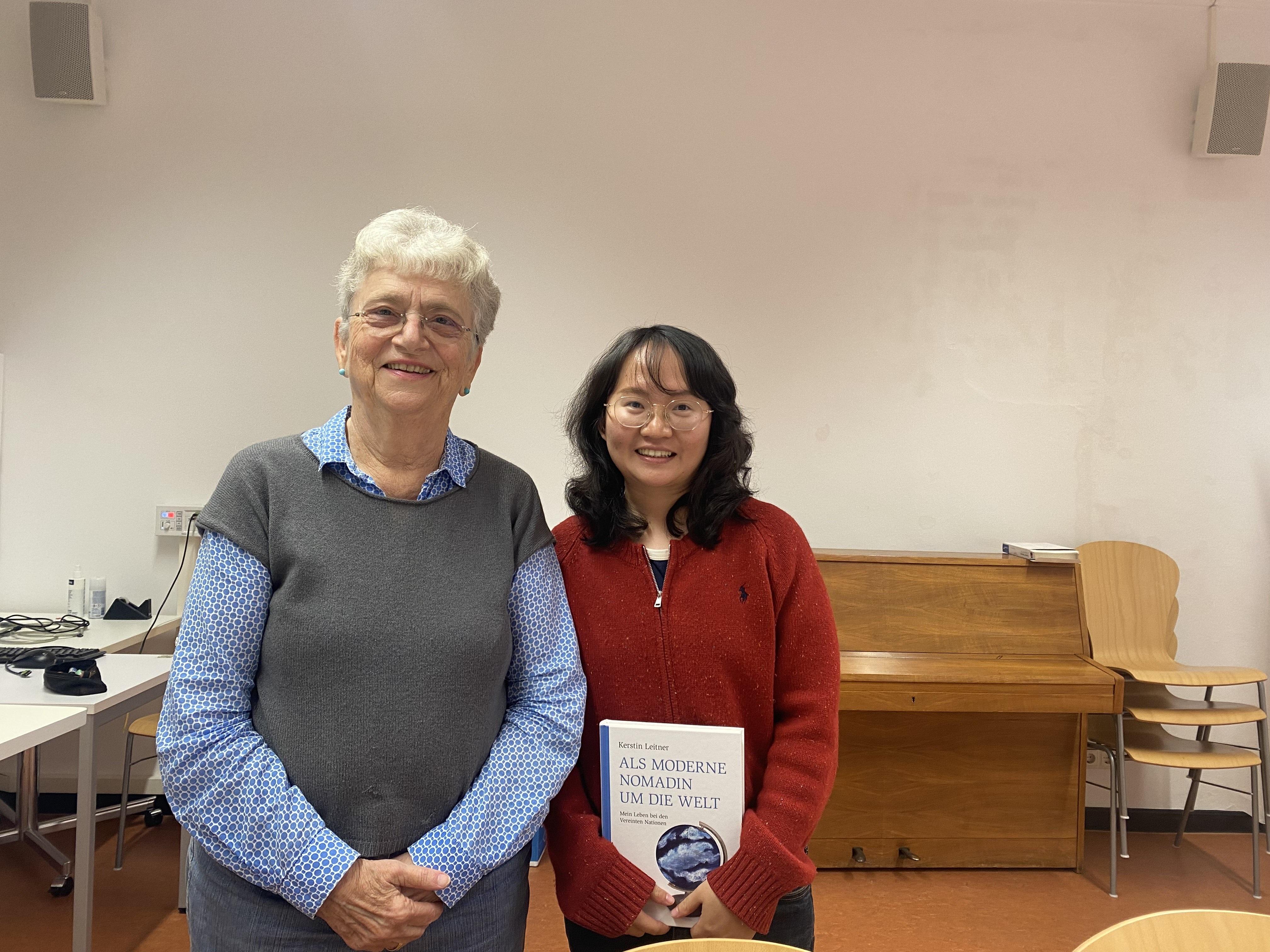
Dr. Kerstin Leitner with Berlin Program Fellow Song Jialu - Photo Credit: Song Jialu
Berlin Program Alumni Panel at the GSA
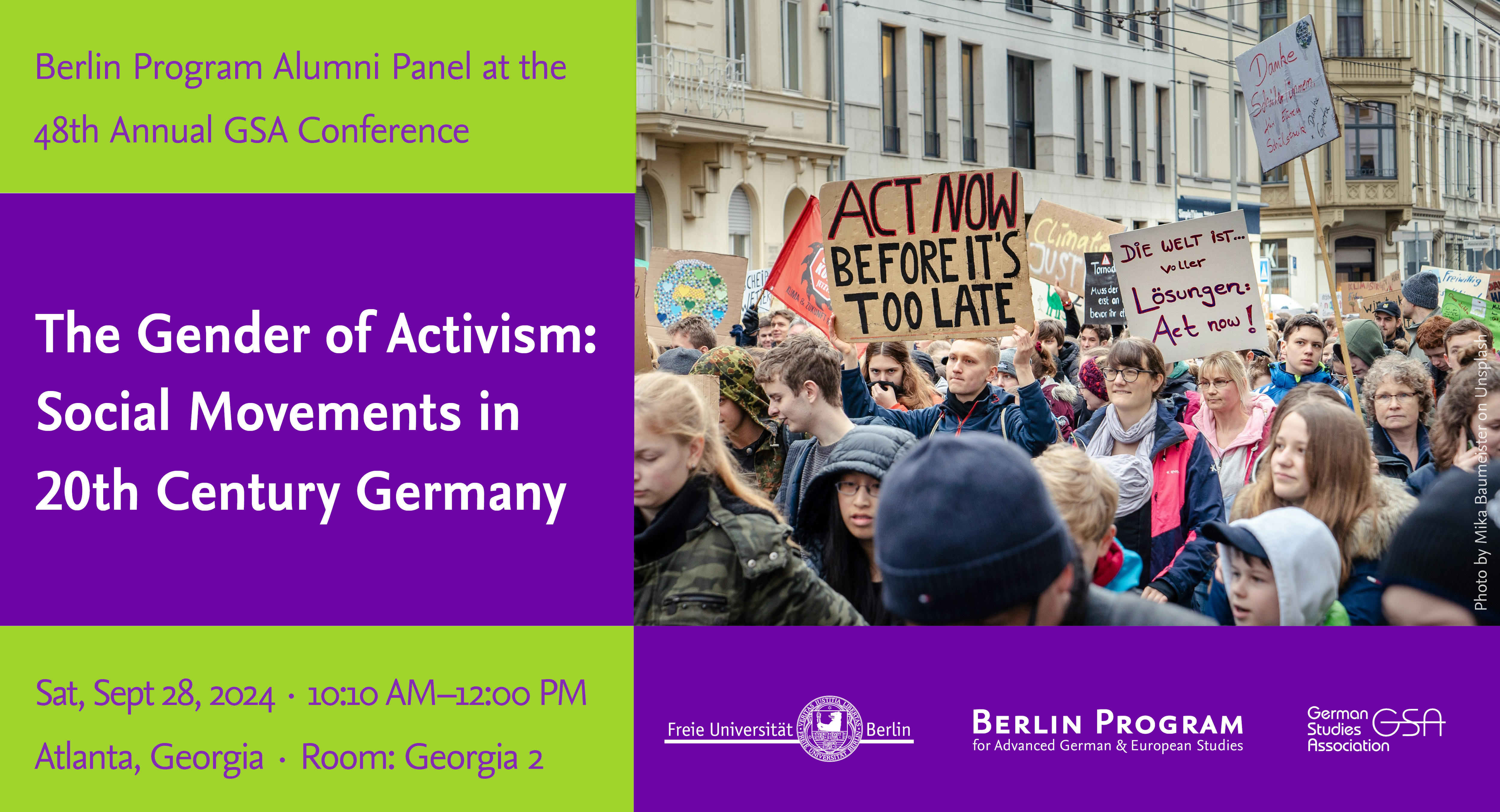
The panel organized by Berlin Program Alumni & Fellows at this year’s GSA Conference September 26-29 in Atlanta, Georgia, USA dealt with the women's activism in Germany from 1933 through to 1989. The presentations addressed: the support women in the KPD, German Communist Party, from 1933-1935 as their male comrades were interred in the first concentration camps (Nicholas Goodell; Vanderbilt University), the use of gendered imagery and rhetoric by Italian “guest” worker housing activism in the early 1970s (Sarah Jacobson; Albion College), the expanded conception of politics developed by feminists adjacent to the extraparliamentary opposition in West German with particular attention to its affective dimensions (Belinda Davis; Rutgers University), and the role of the cultural, moral, and emotional stakes of motherhood in mobilizing women to political opposition in the GDR during the 1980s (Yanara Schmacks; CUNY Graduate Center). Atina Grossmann (The Cooper Union) provided a commentary that offered the presenters much food for thought in their future research. The dialogue between the presenters and audience generated a number of productive threads, principally the role of security in the various activist contexts discussed as well as the questions of transnational networks the various actors were imbricated in. The report is by Duncan Lien (FU Berlin) who also moderated the event.
Berlin Program Summer Workshop
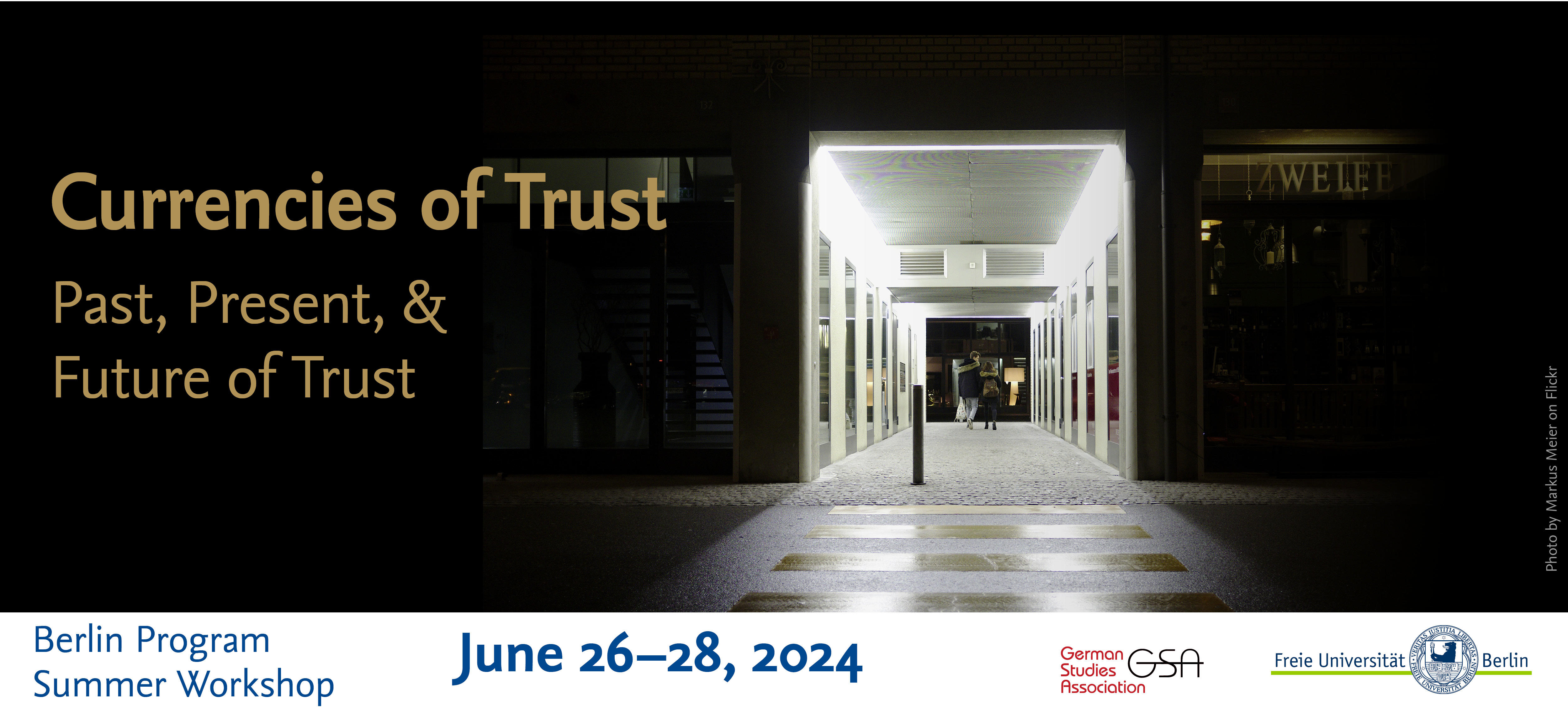
We live in an age in which trust is in short supply. In survey findings published in August 2023, the Gesellschaft für Sozialforschung und statistische Analysen reported that “just 27% of people in Germany have the sense that the nation-state is able to fulfill its responsibilities.” In the January 10, 2024 edition of The Atlantic, Jedediah Britton-Purdy describes the lack of trust in the U.S. with Americans neither trusting government, nor each other. However, he cautions us against misinterpreting this pervasive mistrust which “can feel natural, but it isn’t.” The 2024 Berlin Program Workshop addressed trust and its corollaries from contemporary, historical, and future-oriented vantage points and a variety of disciplines and media forms. Check out the program here.
Guided Tour on Friday, June 28, 2024: Hin und Weg. Der Palast der Republik ist Gegenwart
On the third day of our workshop, we visited a special exhibit which explores the forum's site. Until 2008, the Palace of the Republic stood here as East-Germany's parliament and cultural venue. Tracing the various building phases, materials, events etc. the show examines the question as to why the Palace of the Republic was demolished and the Humboldt Forum was built in its place.
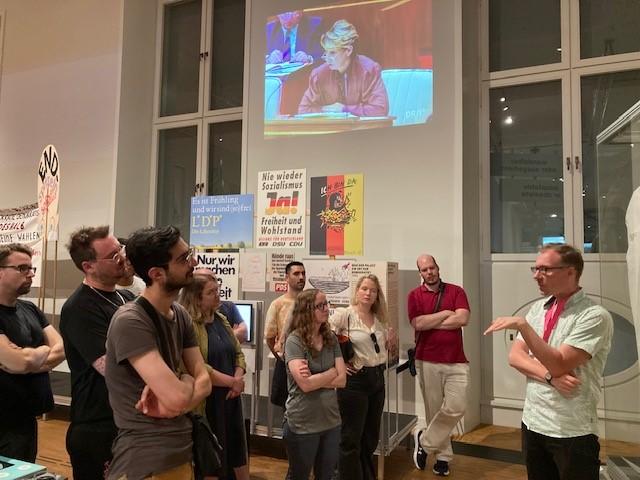
GSA Distinguished Lecture
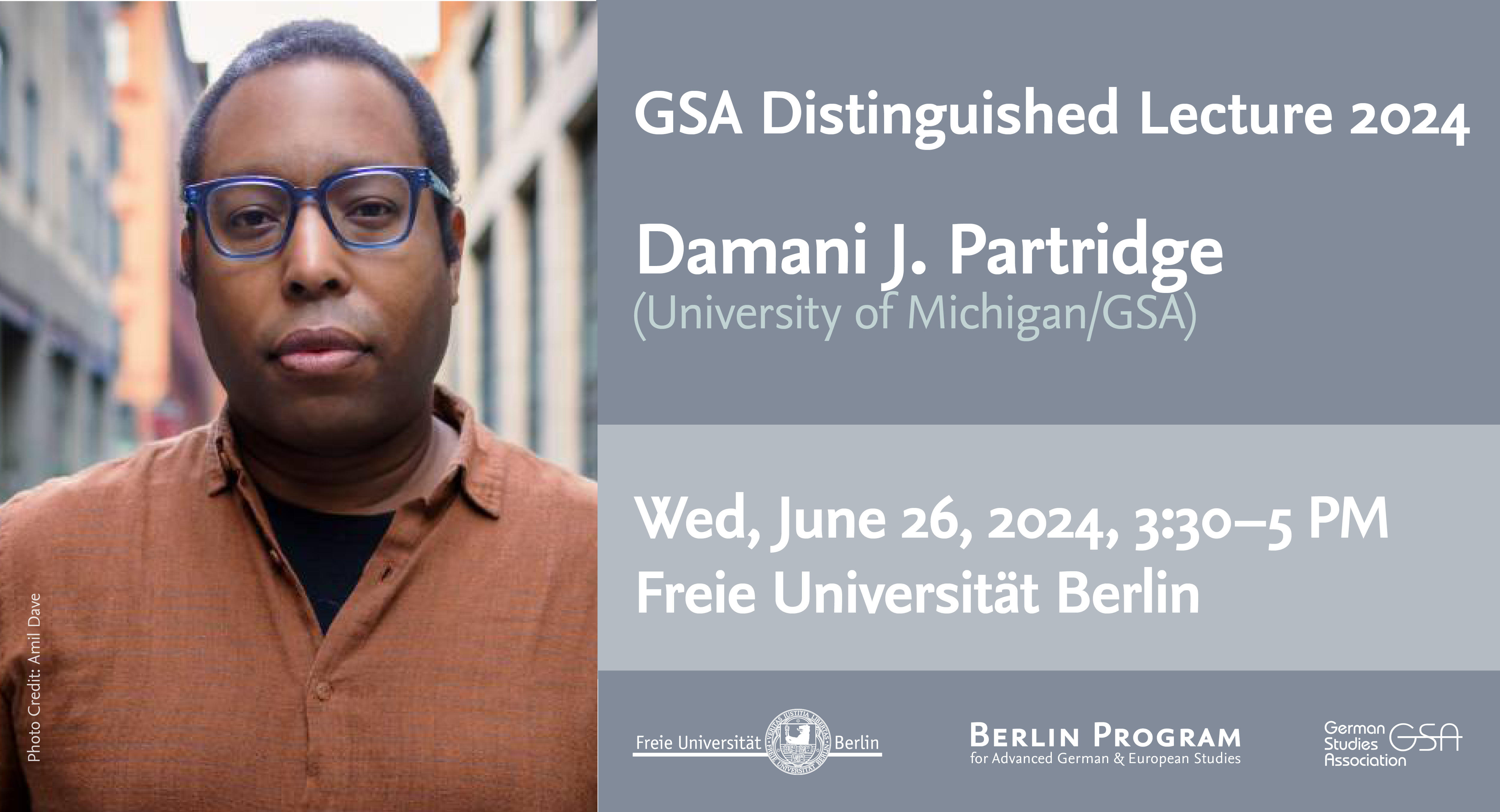
In his talk, Professor Partridge examined the possibilities and limits of a universalized Black politics. Young people in Germany of Turkish, Arab, and African descent use claims of Blackness to hold states and other institutions accountable for their everyday struggle. Partridge tracked how these youth invoke the expressions of Black Power, acting out the medal-podium salute from the 1968 Olympics, proclaiming “I am Malcolm X,” expressing mutual struggle with Muhammad Ali and Spike Lee, and standing with raised and clenched fists next to Angela Davis. Partridge also documented the demands by public-school teachers, federal-program leaders, and politicians that young immigrants take responsibility for countering the global persistence of anti-Semitism as part of the German state’s commitment to anti-genocidal education. He used these stories to interrogate relationships among European Enlightenment, Holocaust memory, and Black futures, showing how noncitizens work to reshape their everyday lives. This interdisciplinary lecture discussed how the concept of Blackness energizes, inspires, and makes democratic participation possible beyond prevailing precepts of national belonging.
Damani J. Partridge is a Professor of Anthropology and Afroamerican and African Studies at the University of Michigan. He is also an affiliate with the Department of Germanic Languages and Literatures, GSA Vice President and GSA President-Elect.
Location: Room 009, Ehrenbergstr. 26/28, 14195 Berlin
Time: 3:30 - 5 P.M. followed by a reception
Guest Lecture
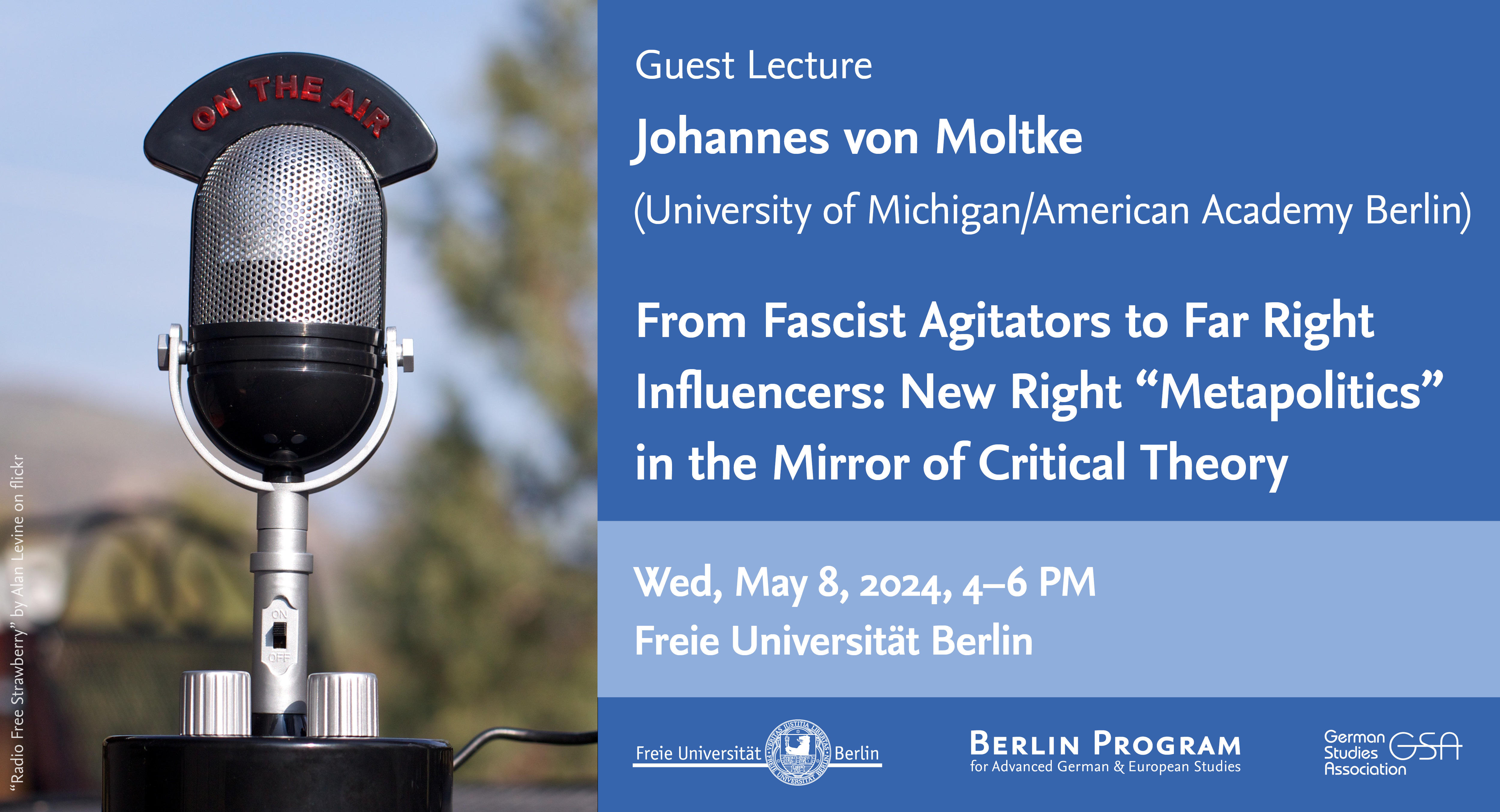
On April 6, 1967 Theodor W. Adorno delivered a lecture at the University of Vienna which has received renewed attention and was published in 2019 in the volume Aspekte des neuen Rechtsradikalismus. This speech capped a long series of analyses in which members of the Frankfurt Institute for Social Research around Adorno and Max Horkheimer had sought to warn of the dangers of fascist agitation, both in the United States and in Germany. The Authoritarian Personality identified social psychological traits of potential fascists, and studies by Adorno, Leo Löwenthal, and Norbert Guterman critically inventoried the themes and “tricks” employed by right-wing radio personalities of their day.
Today, these “prophets of deceit” operate in a different media environment, and the fascist agitators have become new right influencers. In his talk, Johannes von Moltke, Professor of Germanic Languages and Literatures, and of Film, Television, and Media and currently John P. Birkelund Fellow in the Humanities at the American Academy Berlin, examined how the Frankfurt School’s propaganda analyses can be (re)read in the context of today’s social media driven culture wars on both sides of the Atlantic.
Location: Room 009, Ehrenbergstr. 26/28, 14195 Berlin
Time: 4-6 P.M. followed by a reception
